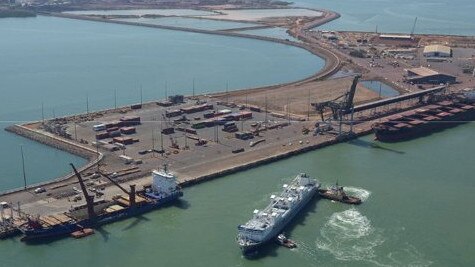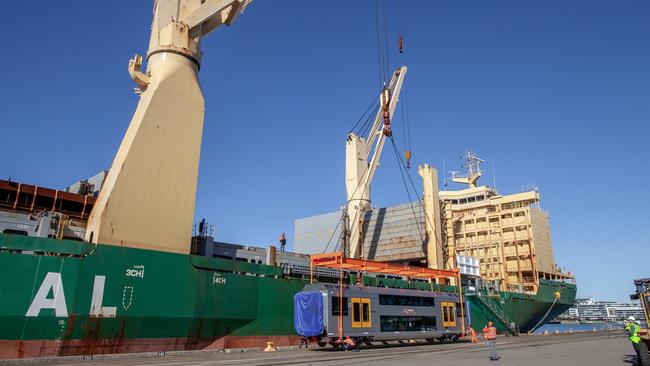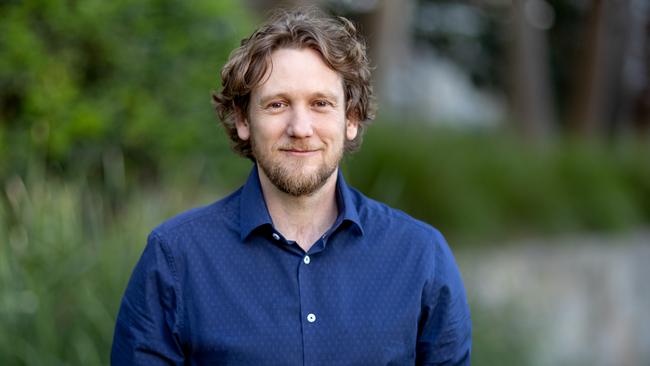
Yet Canberra’s own critical infrastructure register shows China controls the Victorian energy market from generation to transmission to retail supply.
It also controls 50 per cent of the Port of Newcastle, 25 per cent of the Port of Melbourne, 25 per cent of TPG Telecom and large swags of the national gas grid.
Some of these holdings are via Hong Kong-listed companies with well-established governance arrangements, but the reality is if the federal government is concerned about Chinese tentacles it is way too late.
The game’s over and China’s potential influence is plain for all to see.
As an open-trading nation that should not be a worry, but on some assets Canberra has expressed its concerns.
The new big-spending government has used its chequebook and national border controls to play pivotal roles in a range of industries, from petrol refining to education, and from aviation to energy.
Its own critical infrastructure register documents the Chinese control.
The federal government has seemingly gone out of its way to provoke China, with the revocation of the Victorian Belt and Road understanding, renewed concerns over the Port of Darwin and talk of war just the latest in a string of examples.
From a national interest perspective, China can’t take the Darling Downs Pipeline back home, but what is crucial is total transparency.
The level of ownership of critical infrastructure suggests that that is not a given.
Some distinguish between China-owned Landbridge’s 100 per cent stake in the Port of Darwin and China Merchant’s 50 per cent stake in the Port of Newcastle.
The former is a key defence route and gateway port to Australia, whereas Newcastle and Melbourne are less visible.

The reality is that when the then Kennett government privatised Victoria’s energy assets early this century, China was not a first-round participant, but Jeff Kennett opened the doors to encourage much-needed foreign capital.
Same deal with the NSW government’s port privatisation in 2014, when the name of the game was to maximise the sale proceeds with nary a thought to the operation of the ports post sale.
The Port of Newcastle has been at loggerheads with the ACCC and big coal exporters such as Glencore ever since.
China Merchants has had a stated goal of buying small ports as part of the infamous Belt and Road Initiative and is a willing participant in NSW government plans to extend the port to a container terminal.
Ironically Josh Frydenberg, while the Treasurer has been taking a hard line on some China acquisitions wearing his FIRB hat, has effectively backed China Merchants from day one in its fight with the ACCC and Glencore.
Consistency has not been a hallmark of government policy on either China or FIRB.
Beijing Enterprises controls the Adelaide Desal plant along with a range of other water treatment plants.
All five electricity networks in Victoria are controlled by Chinese companies.
Hong Kong companies control the third and fourth-biggest energy retailers — China Light and Power controls Energy Australia and Chow Tai Fook owns Alinta.
These two companies own electricity generators including Victoria’s Yallourn and Loy Yang B and Mount Piper in NSW.
Chinese government-controlled State Grid controls 60 per cent of Jemena, which owns 100 per cent of a gas pipeline across the country, while Hong Kong-based CKI owns others, including Western Australia’s Dampier to Bunbury pipeline and gas distribution network MultiNet.
The other 40 per cent of Jemena is owned by the Singapore government.
CKI also owns 100 per cent of MultiNet and Australian Gas Networks, 51 per cent of SA Power Network, 66 per cent of United Energy and controlling stakes in Citipower and Powercor. China Investment Corp owns 14 per cent of the East Link Freeway in Melbourne and 20 per cent of the Port of Melbourne.
The Hong Kong-listed companies were historically treated separately from Chinese state-owned enterprises but this distinction is arguably now questionable.
They were keen to invest outside China in regulated assets offering steady income flow, but conspiracy theories can now spin a different motive.
At the very least, the extensive levels of Chinese ownership of critical infrastructure presents the federal government with a policy conundrum as it proceeds blindly on an apparent path to destroy the Chinese relationship.
Collaring green cred

Carbon project developer Green Collar has targeted the Australian consumer market by buying Go Neutral and hiring its founder as its chief technology officer.
Go Neutral was started a year ago by long-time Google executive Casey Whitelaw and sells car stickers for $90 each for a year to apply for offset programs.
Whitelaw will join Green Collar under the deal.
Green Collar managers 15 million hectares of land developing different sorts of carbon credits.
Co-founder James Schultz says: “The acquisition provides a retail platform to rapidly scale direct consumer demand for high-quality offsets that deliver real environmental benefits.
“Australia has over 20 million owned cars, producing 60 million tonnes of carbon each year, and the transition to EV cars will take time to gather momentum.”
Whitelaw says: “Go Neutral is all about helping more people take action on climate change by making it simple, effective and accessible.
“Instead of asking a few people to be perfect, we can make a bigger difference by helping Australians take impressive, inspirational steps in the right direction.”
The concept of offsets is not new, with Green Fleet doing similar things taking donations to restore projects.
Qantas reports that 10 per cent if its passengers apply offsets to their flights, which the airline then uses on carbon offset programs.
The mantra of Green Collar’s Schultz is: “The best way to solve the most complex issues like the environment is to put them on a balance sheet.
“If you want to change behaviour, then you put a price on it.”
Along with other members of the so-called carbon club, he is pushing for the creation of a properly functioning carbon market in Australia which can be taken globally.
He said he likes the simplicity of the Go Neutral product, which has just under 1000 users nationwide aiming for one million car owners.
Whitelaw spent 15 years working with Google around the world before leaving last year from its Sydney office.
His aim is to “connect normal people with accessible climate action”.
The money raised will be directed to Green Collar projects, which, Schultz says, is all aimed at boosting farm gate returns.
Working out just how much farmers earn is difficult because it depends on where the land is with more carbon regeneration.
As a guide, Australian carbon units were traded at $18.50 a tonne, compared with $66 a tonne in Europe and $36.90 in New Zealand. Independent figures put trade in Australian carbon units at about $160m a year, which is just a ballpark figure.
A 10,000ha farm may generate two tonnes of carbon with the farm generating $240,000 a year in income, of which the developer collects 30 per cent and the farmer about $168,000 before royalties and other payments.
KKR acquired a minority stake in Green Collar last year for just over $100m.




Last month, the federal government, in a ham-fisted way, cancelled the Victorian government’s largely ceremonial Belt and Road Initiative agreement with China.